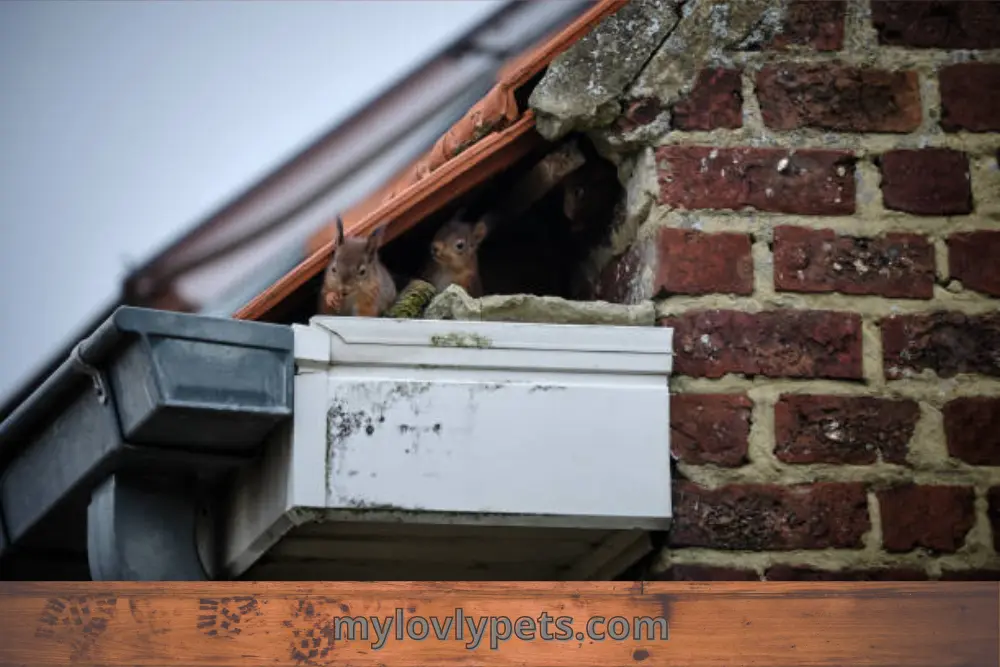
How Long Can A Squirrel Live Trapped In A Chimney?
Squirrels find shelter from the harsh winter weather and potential predators in attics, chimneys, and other enclosed areas.
However, this can result in a wide variety of issues for residents, including noise, property damage, and health issues. Find out if a squirrel has taken up residence in your chimney and how long can a squirrel live trapped in a chimney with the help of this helpful guide.
In addition to posing a health danger to you and your family, squirrels may also cause a lot of noise and damage your property.
Is There A Squirrel In My Chimney?
It may be a squirrel if you hear scrambling, scratching, or chomping sounds from your fireplace. Noises like scratching or nibbling can be heard from within the walls or ceiling, which is the most common indicator.
Squirrels can also leave droppings or urine stains near where they are caught. If you find a squirrel in your house, ensure it is released humanely as soon as possible. While squirrels may find refuge in your chimney from predators, they can do serious damage by nibbling on the bricks or nesting material, and their droppings may even spread disease. If you think there’s a squirrel in your chimney, having a professional handle the problem is better.
How Long Can a Squirrel Live Trapped in a Chimney?

How long a squirrel can live in a chimney depends on the type of squirrel and the chimney’s condition.
The grey squirrel is the most common in North America and has a lifespan of about ten years. Grey squirrels can only survive for a few days or weeks if stuck in a chimney. Red squirrels are smaller and only last approximately five years in the wild, but they are better at surviving in chimneys. A red Squirrel stuck in a chimney could make it for a few months.
Do Squirrels Make Nests in Chimneys?
Squirrels can make nests in chimneys because these are tall, have lots of holes to hide in, and can get up to 100 degrees Fahrenheit inside. This is especially good for baby squirrels who cannot regulate their body temperature. A squirrel or squirrel family will find a chimney an excellent alternative to a tree for raising their young.
If you have a squirrel in your home, it likely came in through an opening in the eaves, roofline or soffits or was already living there when you moved in.
How Long Can a Squirrel Live in a Chimney Without Food?
The answer to how long a trapped squirrel can live depends on a few factors, including whether it has food and water and how warm or cool it is inside your home. If the temperature is too hot or too cold, the squirrel won’t survive for very long, and without food or water, a squirrel will only last a few days at most. If you want to get rid of a squirrel, your best bet is to call a wildlife removal company that can safely and humanely remove it.
Can Squirrels Climb Out of Chimney?
Squirrels can climb up chimneys and other high surfaces, like brick walls and fences. They can climb with ease because of their long tails and sharp claws. A squirrel will use its sharp claws to grab the bricks or mortar between them and its strong hind legs to propel itself upwards through the chimney.
How Do I Get a Squirrel Out of My Chimney?
If you have a squirrel problem in your home, you should take steps to keep them from getting in. You can do this in some ways, one of which is to place a metal screen over the top of your chimney opening and to fill in any other outlets you find on the house’s exterior.
How Do I Get Rid of Squirrels in My Chimney?
Calling a professional or constructing a squirrel chimney trap at the top of the flue is the most accessible approach to get rid of a squirrel that has become stuck in the chimney. A long chimney snare pole can access the nest and pull-out babies. Starting a fire to scare the squirrel away could be fatal.
A great option is dropping a heavy rope down the chimney so squirrels can escape. To get a squirrel out of a chimney, check on it occasionally and remove the string once the animal is out.
If squirrels live in your chimney, block all the holes they can use to get in and leave only the top of the flue open. Please set up a one-way door to allow the animals to escape but prevent them from re-entering. If the squirrel doesn’t come out immediately, leave the rope there for a few hours and check again.
What Other Animals Can Nest in Chimneys?
Squirrels are the most common animals that nest in a chimney. Birds choose to nest atop the chimney because of its safety from predators and the warmth it provides, while bats, which thrive in the dark, use the flues as an isolated spot to mate.
Raccoons are the most dangerous animal to live in your chimney because they are territorial, may scratch and bite, and can spread diseases like rabies and roundworm. Putting stainless steel covers on the chimney is suggested to keep raccoons out.
Squirrel in Chimney Sound
If you suspect a squirrel in your chimney, the first step is to confirm your suspicions. You might hear strange sounds like scurrying, jumping, or scratching. Squirrels chew several materials. Therefore, you’ll hear gnawing sounds.
First, you will need to know what you’re dealing with if your fireplace is making a lot of scratching and scuffling noises. Thankfully, the answer is obvious: squirrels are noisy during the day, whereas raccoons are noisier at night.
This is a better way to tell than by sound because even a small squirrel can make a lot of noise. A squirrel is likely stuck in your chimney if you hear scratching sounds that won’t go away.
Do Squirrels Like Chimneys?
Interestingly, a squirrel finds the tops of chimneys to be rather inviting. These are cool in the summer and warm in the winter, and shady and safe from most predators. Squirrels may accidentally stray into your chimney occasionally and depart independently, or they may get so pleased there that they decide to stay constantly.
Squirrels often find their way up chimneys in the winter to warm themselves by the furnace flue. When they feel the heat, they hit the gas in the furnace flue and fall backwards into the chimney, where they like to nest and have their babies. This is why you find them in the chimney.
Squirrel in The Chimney, Who to Call?
Getting a squirrel out of a chimney alone is only sometimes possible because animals can become stuck behind parts of a prefabricated (non-masonry) fireplace and chimney.
Call an animal removal expert if a squirrel has taken up residence in your chimney and you cannot trap or coax it. You should contact an animal control expert if you discover a raccoon, raptor (owl), bat, snake, or other potentially deadly animal in your chimney.
How Long Until a Squirrel Starves to Death?
If an adult squirrel went without food for eight days, it would likely starve to death. Babies may not survive more than a day without their mother’s milk, and young squirrels are likely to die within five days.
How to Smoke Out a Squirrel?
Pests like squirrels can be driven away with the help of smoke bombs, but these devices are not always effective and pose a significant risk to human health and safety. The smoke might get the squirrel to leave, but it could also make them go deeper into your home.
A smoke bomb, smoke detector, fire, smoke machine, smoke grenade, fog machine, spray smoke, or smudge pot are all effective methods of driving away a pesky squirrel. Smoking out a squirrel takes 30 seconds for the smoke bomb, 2 minutes for the Smoke Detector, 5 minutes for the fire, 10 minutes for the smoke machine, 15 minutes for the smoke grenade, 20 minutes for the fog machine, 25 minutes for the spray smoke, and 25 minutes for the smudge pot.
What to Do If an Animal is in Your Chimney?

It’s crucial to know what to do if an animal is stuck in or has built a nest inside your chimney. Don’t worry; open the fireplace damper and cover the opening in front with a glass or metal screen.
You should contact an animal removal service if the animal cannot leave. Using smoke to scare away an animal stuck in the chimney pot could kill the animal and keep it there. If the chimney pot is clogged, you could smoke your house or risk a fire. Trying to remove an animal by hand is risky, so keep the damper open.
How to Prevent a Squirrel Getting into Chimney Home?
Putting up a chimney cap is the most effective approach to keep unwanted guests out of the chimney. While allowing smoke and gases to escape from the fireplace, the wire mesh screen prevents unwanted pests and squirrel from entering the home. A spark arrestor stops hot embers from flying out of the flue and potentially igniting the roof.
The chimney cap, which keeps rain and snow out of the flue and reduces the likelihood of backdrafts, should be inspected at least once a year, preferably during a professional chimney inspection.


